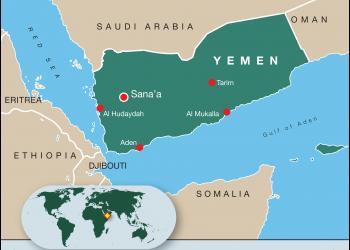UN Expert: Persecution of Baha’is in Yemen mirrors Iran’s actions
In a statement issued on Monday, 22 May, the UN Special Rapporteur on religious freedom highlighted the striking resemblance of recent assaults against the Baha’is in Yemen to that of the persecution of the Baha’is in Iran.
“The recent escalation in the persistent pattern of persecution of the Baha’i community in Sana’a mirrors the persecution suffered by the Baha’is living in Iran,” said Ahmed Shaheed, the United Nations Special Rapporteur on freedom of religion or belief.
“The harassment against the Bahá’ís, as religious minorities, seems to persist, if not worsen amounting to religious persecution in Yemen,” the human rights expert said.
In April, the authorities called for the arrest of over 25 Baha’is, many of whom are prominent members of the Baha’i community and assist with the organization of the community’s affairs, under extraordinary accusations which include helping poor families, showing kindness, and displaying rectitude of conduct in order to attract people to the Baha’i Faith. Since then, and through increasingly subversive methods, including kidnappings conducted by plainclothes agents, four more Baha’is have been arrested, including Mr. Walid Ayyash, a prominent Yemeni tribal leader. As of 25 May, the authorities have detained seven Baha’is and denied them necessary medical attention.
These disturbing events constitute the latest acts in a series of assaults heaped upon the Yemeni Baha’i community. These include the 2013 arrest and ongoing court case of Mr. Hamed bin Haydara, as well as the mass arrest of over 60 participants, half of whom were Baha’is, at an educational gathering in 2016. Mr. Keiwan Qaderi, who was among those arrested, has been in prison for over eight months. More recently, on 5 April, an employee of an international organization who is a Baha’i was arrested in Sana’a simply because of his faith.
“The new wave of court summons and arrest orders appears to be an act of intimidation pressuring the Yemeni Bahá’ís to recant their faith,” Dr. Shaheed stated. “It is unacceptable for anyone, including persons belonging to religious minorities, to be targeted or discriminated based on religion or belief,” he added.
Multiple independent sources have, since 2016 and through their conversations with various officials in Yemen, repeatedly confirmed that Iranian authorities are directing efforts to persecute the Baha’is in Yemen. Specifically, Mr. Rajeh Zayed who is from the Prosecution Office and has displayed inimical behaviors against the Bahá’í community over several years, the Political Security Office, as well as high-ranking authorities in the National Security Office are known to be involved in the recent persecution against the Bahá’ís. In addition, such high-ranking authorities have been repeatedly reported as receiving instructions from Iran in order to persecute the Bahá’í community.
Diane Ala’i, a Representative of the Baha’i International Community in Geneva further commented “for the authorities in Iran to systematically persecute fellow citizens because of their belief is appalling”, and she added, “but for those same authorities to also persecute citizens of other countries outside of Iran, particularly in a country facing a mounting humanitarian crisis, is utterly contemptible.”
Iranian involvement in the persecution of the Baha’is in Yemen is consistent with a general policy aimed at dealing with “The Baha’i Question” as outlined in a once secret 1991 government memorandum.
That memorandum, endorsed by Iran’s Supreme Leader, outlines a wide range of economic, educational, and social measures aimed at “blocking the development” of the Iranian Baha’is. It also explicitly states the intention of Iranian authorities to “confront and destroy their [the Baha’is’] cultural roots outside the country [Iran]”.
“Such persecution, however, comes against the will of a local population, which has demonstrated an unprecedented level of support for the Baha’is,” commented Ala’i.
In the most recent show of solidarity, hundreds of Yemenis—led by tribal leaders and human rights activists—gathered on the morning of 15 May 2017 to denounce the recent call for the arrests of several Yemeni Baha’is, among them Mr. Walid Ayyash, a prominent tribal leader, and to demand their immediate release.
During the peaceful demonstrations, Mr. Zayed threatened the crowd with a weapon and attempted to incite violence against those present. He reportedly stated that “today, blood will reach the knees”. He then ordered the security forces to shoot at the protestors.
Despite the subsequent shooting that ensued, the crowd remained peaceful. Fortunately, no one was severely hurt in the incident.
Following this event, tribal leaders issued a statement calling for the release of Mr. Ayyash, detailing the events of 15 May, and requesting the judiciary to prosecute Mr. Zayed for “his intentional harm of Sheikh Walid Ayyash and his friends, and continuation of physical harm and suspicion of attempted murder,” as well as “the explicit assault with live ammunition of nonviolent citizens participating in a peaceful protest, and the violent acts that could have led to a disaster costing the lives of scores of people.”
The full statement of Dr. Shaheed can be read in English here and in Arabic here. A provisional translation of his statement into Persian can be found here.
To read this in Arabic, click here.
To read this in Persian, click here.
